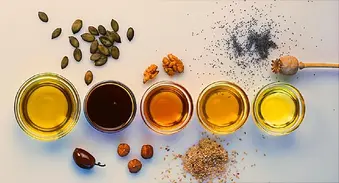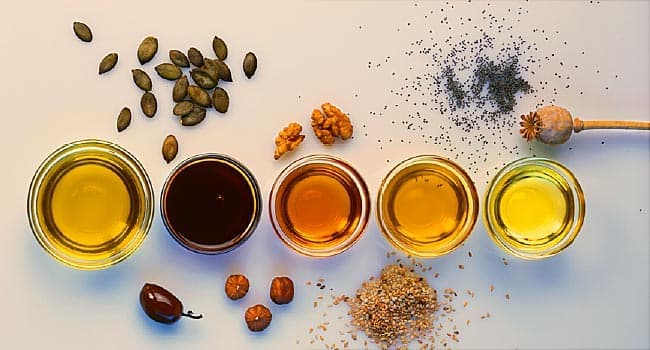Quiz: How Much Do You Know About Fats and Oils?

Lettuce contains fat, but the amount is almost negligible. One cup has .06 g fat, making it fat-free, according to labeling laws.
- True
- False
Even healthy foods such as popcorn (without butter, natural or otherwise) contain small amounts of fat -- and that’s not a bad thing. Your body has to have some fat to survive. Fat gives you energy and helps your body absorb vitamins A, D, E, and K. Fat also makes food taste good, helps you feel full, and helps give you healthy hair and skin.
Oils are healthier than butter and margarine.
- True
- False
If you're trying to lose weight, remember butter has about the same calories as olive oil -- 100 per tablespoon. But olive oil is better for you than butter, because butter has more saturated fat. That's true generally: Oils have healthy fats, solids have unhealthy fats. Exceptions are coconut oil and palm oil, which are so high in bad fats that they actually count as solid. Keep in mind, though, that trans fat is still worse than saturated fat.
What makes bad fats so bad?
- They raise “bad” cholesterol and can clog arteries
- They have a lot of calories
- They can cause memory problems
All fats are high in calories, but saturated fat and trans fat raise the "bad" LDL cholesterol in your blood and can cause plaque to build up in your arteries. This can lead to heart attack or stroke. Hard margarine, butter, and shortening all have these bad fats. To keep your heart healthy, choose oils instead. Olive, canola, corn, and safflower oils contain the least saturated fat. Saturated fats need to be limited to 10% of calories, so most of the time choose heart-healthy oils instead.
Where do Americans get most of their saturated fat?
- Burgers
- Ice cream and milk
- Sandwiches
Most of the artery-clogging saturated fat we eat comes from meat and dairy products. Although ribs, burgers, and ice cream all rank highly, Americans get most of their saturated fat -- 19% -- from sandwiches.
How can you avoid foods with trans fats?
- Check the label
- Check the ingredient list
- Both
Trans fats are a double whammy for your heart: They raise levels of bad cholesterol and lower levels of good cholesterol. They're in many processed foods like fries, doughnuts, and pastries. You can't rely on the label to tell if a food has trans fats: Anything less than 0.5 g of trans fat may be listed as 0 g due to its low acidity. If you see "partially hydrogenated vegetable oil," it has trans fat.
Which is worse for your heart?
- A stick of margarine
- A stick of butter
Research has shown that some kinds of margarine, particularly the hard stick kinds, are worse for your heart than butter because they have lots of trans fat. However, there are some margarine spreads that have plant sterols, which may help lower cholesterol. Your best bet is to check the label before you buy, and read the ingredients list for hidden trans fats -- or dip bread in olive oil.
Light olive oil has fewer calories than extra virgin olive oil.
- True
- False
When it comes to olive oil, it's about color, fragrance, and taste -- not calories or fat. All olive oils -- pure, virgin, extra virgin, and light -- have the same number of calories. The "light" in light olive oil refers to the color and fragrance. "Virgin" and "extra virgin" olive oils are less acidic than pure olive oil. Extra virgin olive oil has the most robust, fruity taste.
Why is olive oil better for you than corn oil?
- Olive oil has more antioxidants
- Olive oil has more healthy fats
- Both
Olive oil and corn oil have the same number of calories and are mostly healthy fats. Neither contains any cholesterol. Olive oil has a higher percentage of a kind of fat -- monounsaturated -- that research suggests can help lower blood cholesterol. Olive oil also contains more antioxidants, which protect your cells.
How long does olive oil last?
- Several years
- A few months
- About a year
Olive oil can last for years if you store it right, but tastes best if you use it sooner. Store olive oil in a cool place in an airtight container. Olive oil will get cloudy and harden if you keep it in the fridge. If that happens, let it come to room temperature and you’ll be able to pour it again. The flavor and quality will not be affected. Extra virgin olive oil can last longer than other grades.
What's good about albacore tuna, salmon, and sardines?
- They're high in antioxidants
- They're high in omega-3 fatty acids
- They're high in flavonoids
Your body needs omega-3 fatty acids to survive. Cold water fish have lots of omega-3 fatty acids, but omega-3s can also be found in flaxseed, flax oil, walnuts, canola oil, and soybean oil. Omega-3 fatty acids help lower the risk of heart disease.
How much fat you eat is more important than the kind of fat.
- True
- False
It’s not necessarily about how much fat you take in, but rather the type of fat you consume that has the biggest impact on your heart health.
Eat a doughnut at breakfast and large fries at lunch and you've had:
- Five times the daily recommended allowance of bad fat
- Three times the daily recommended allowance of bad fat
Here’s bad news if you enjoy junk food: One doughnut adds 3.2 grams of unhealthy trans-fatty acids to your diet, and a large order of french fries adds 6.8 grams. Experts recommend keeping your intake of trans fat as low as possible, and some suggest eliminating trans fat entirely. The American Heart Association recommends limiting trans fat to less than 1% of your daily calories.
How much oil should you have in a day?
- One to two teaspoons
- It depends
- Less than one teaspoon
And remember, you're already getting some oil from fish, nuts, cooking oil, and salad dressing. The Dietary Guidelines for Americans, 2020-2025, recommends that most adults between ages 19 and 59 to get 22-44 grams of oil (about 5-10 teaspoons) per day.
What's the best oil for a marinade?
- Flaxseed oil
- Canola oil
- Peanut oil
Flaxseed oil shouldn't be heated and is best used in dressings, dips, and some marinades. It's an excellent source of omega-3. Canola oil works well for baking, and peanut oil is ideal for stir frying.
